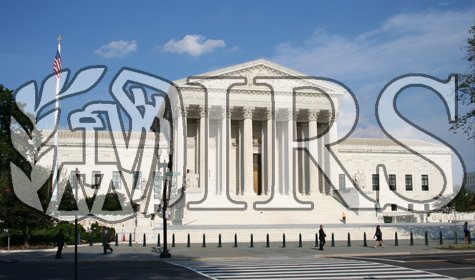While some are celebrating the Supreme Court’s ruling on the equality of gay marriage, others are aghast at the idea that some states are fighting against it. Most everyone in the United States believes that what the Supreme Court decrees is the final say on any matter in the country and the de facto law of the land. But, here’s a question that no one seems to be asking: If the Supreme Court’s Rulings are the defacto law of the land then why are we still paying income tax to the federal government? There are two Supreme Court Cases in point that should make people posit this question. They are Brushaber v. Union Pacific R. Co. and Stanton v. Baltic Mining Co. Both of these cases were heard regarding the Federal Income Tax.
The first case, was laid down on January 24, 1916 and was the case of Brushaber v. Union Pacific R. Co. In that ruling the court stated that:
“…the proposition and contentions under [the 16th Amendment]…would cause one provision of the Constitution to destroy another; That is, they would result in bringing the provisions of the Amendment exempting a direct tax from apportionment into irreconcilable conflict with the general requirement that all direct taxes be apportioned; The result, instead of simplifying the situation and making clear the limitations of the taxing power, which obviously the Amendment must have intended to accomplish, would create radical and destructive changes in our constitutional system and multiply confusion…The 16th Amendment as correctly interpreted, is limited to indirect taxes and for that reason is constitutional…”
And, what is an indirect tax? The definition of an indirect tax is:
“A charge levied by the State on consumption, expenditure, privilege, or right but not on income or property…”
But, that’s not the only time we heard from the Supreme Court on the matter. On February 12, 1916, just one month after the Brushaber case, the case of Stanton v. Baltic Mining Co. also came to the highest court in the land. In it the Supreme Court ruled that:
“[the 16th Amendment]…conferred no new power of taxation.”
Before the passage of the sixteenth amendment, there was no direct taxation on an individual’s income. So, if the sixteenth amendment “conferred no new power of taxation” then that would mean that the large sums of money that we are forced to send to the IRS every April 15th are, indeed, illegal taxation.
Yet, try not paying your taxes and see where that gets you or, better yet, try telling the IRS that the Supreme Court stated… Any attempts to reason or point this out to the Federal Government or the IRS will, at best, get you a letter (or worse) explaining that these are “Frivolous Tax Arguments”.
So then, where does that leave the American People? Does the Supreme Court have the final say in all matters, as we are taught and everyone in the nation seems to believe, or does the Supreme Court merely issue opinions that carry very little weight and can be freely ignored? Either way, it leaves the American People in a very precarious state in relation to their rights and the federal government. For, if it is the final say on all matters, our government has been reduced to an oligarchy of nine politically connected lawyers having the ability to make law for a nation of 318 million. But, if it is an institution that merely issues opinions that carry very little weight and can be freely ignored then our 50 States have been pushed into subjugation based on an institution that does not have the authority to overrule the states own sovereign powers.
But, maybe the truth of the matter is even more unsettling than most of us want to admit to; that the federal government is an entity that only exists to serve itself, cherry picking which rules it will enforce upon us irrespective of We The People?

